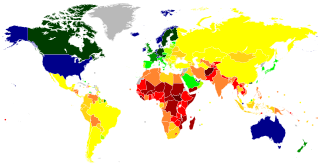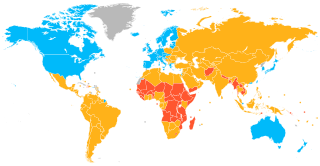
The economy of Italy is a highly developed social market economy. It is the third-largest national economy in the European Union, the second-largest manufacturing industry in Europe, the 8th-largest economy in the world by nominal GDP, and the 12th-largest by GDP (PPP). Italy is a founding member of the European Union, the Eurozone, the OECD, the G7 and the G20; it is the eighth-largest exporter in the world, with $611 billion exported in 2021. Its closest trade ties are with the other countries of the European Union, with whom it conducts about 59% of its total trade. The largest trading partners, in order of market share in exports, are Germany (12.5%), France (10.3%), the United States (9%), Spain (5.2%), the United Kingdom (5.2%) and Switzerland (4.6%).

Per capita income (PCI) or total income measures the average income earned per person in a given area in a specified year. It is calculated by dividing the area's total income by its total population.

A stock market, equity market, or share market is the aggregation of buyers and sellers of stocks, which represent ownership claims on businesses; these may include securities listed on a public stock exchange as well as stock that is only traded privately, such as shares of private companies that are sold to investors through equity crowdfunding platforms. Investments are usually made with an investment strategy in mind.
Purchasing power parity (PPP) is a measure of the price of specific goods in different countries and is used to compare the absolute purchasing power of the countries' currencies. PPP is effectively the ratio of the price of a basket of goods at one location divided by the price of the basket of goods at a different location. The PPP inflation and exchange rate may differ from the market exchange rate because of tariffs, and other transaction costs.

A developed country, or high-income country, is a sovereign state that has a high quality of life, developed economy, and advanced technological infrastructure relative to other less industrialized nations. Most commonly, the criteria for evaluating the degree of economic development are the gross domestic product (GDP), gross national product (GNP), the per capita income, level of industrialization, amount of widespread infrastructure and general standard of living. Which criteria are to be used and which countries can be classified as being developed are subjects of debate. Different definitions of developed countries are provided by the International Monetary Fund and the World Bank; moreover, HDI ranking is used to reflect the composite index of life expectancy, education, and income per capita. Another commonly used measure of a developed country is the threshold of GDP (PPP) per capita of at least US$22,000. In 2023, 40 countries fit all four criteria, while an additional 15 countries fit three out of four.

A millionaire is an individual whose net worth or wealth is equal to or exceeds one million units of currency. Depending on the currency, a certain level of prestige is associated with being a millionaire. Many national currencies have, or have had at various times, a low unit value, in many cases due to past inflation. It is obviously much easier and less significant to be a millionaire in those currencies, thus a millionaire in Hong Kong or Taiwan, for example, may be merely averagely wealthy, or perhaps less wealthy than average. A millionaire in Zimbabwe in 2007 could have been extremely poor. Because of this, the term 'millionaire' generally refers to those whose assets total at least one million units of a high-value currency, such as the United States dollar, euro, or pound sterling.

The distribution of wealth is a comparison of the wealth of various members or groups in a society. It shows one aspect of economic inequality or economic heterogeneity.

GIC Private Limited is a Singaporean sovereign wealth fund that manages the country's foreign reserves. Established by the Government of Singapore in 1981 as the Government of Singapore Investment Corporation, of which "GIC" is derived from as an acronym, its mission is to preserve and enhance the international purchasing power of the reserves, with the aim to achieve good long-term returns above global inflation over the investment time horizon of 20 years.
High-net-worth individual (HNWI) is a term used by some segments of the financial services industry to designate persons whose investible wealth exceeds a given amount. Typically, these individuals are defined as holding financial assets with a value greater than US$1 million. "Very-HNWI" (VHNWI) can refer to someone with a net worth of at least US$5 million. As of December 2022, there were estimated to be just over 15 million HNWIs in the world according to the World's Wealthiest Cities Report 2023 by Henley & Partners. The United States had the highest number of HNWIs of any country, whilst New York is the wealthiest city with 340,000 HNWIs.
In economics, valuation using multiples, or "relative valuation", is a process that consists of:
Global assets under management consists of assets held by asset management firms, pension funds, sovereign wealth funds, hedge funds, and private equity funds.

UBS Group AG is a multinational investment bank and financial services company founded and based in Switzerland. Headquartered in Zürich, it maintains a presence in all major financial centres as the largest Swiss banking institution and the largest private bank in the world. UBS client services are known for their strict bank–client confidentiality and culture of banking secrecy. Because of the bank's large positions in the Americas, EMEA, and Asia Pacific markets, the Financial Stability Board considers it a global systemically important bank.
Wealth is the total sum value of monetary assets and valuable material possessions owned by an individual, minus private debt, at a set point in time.








